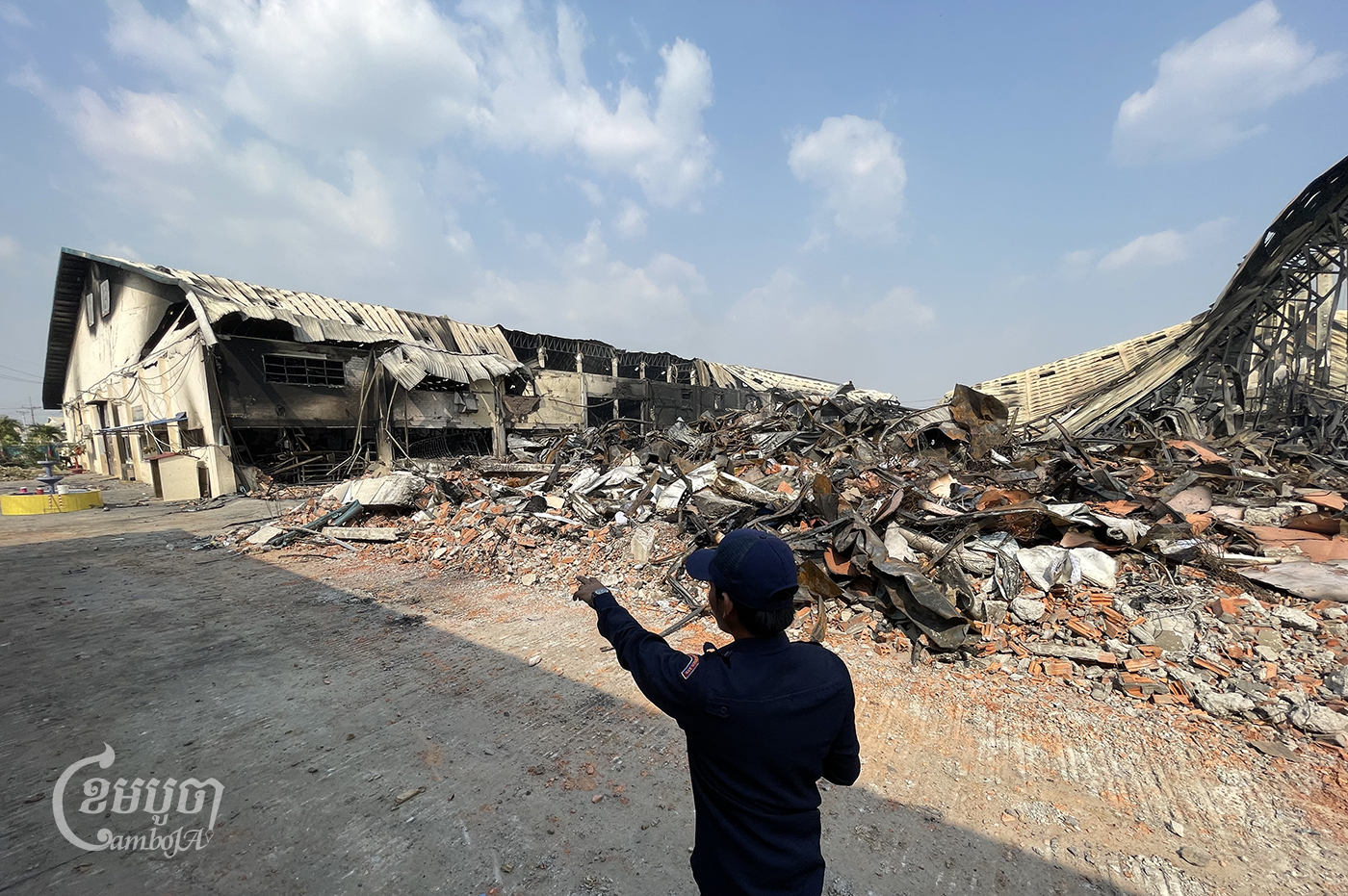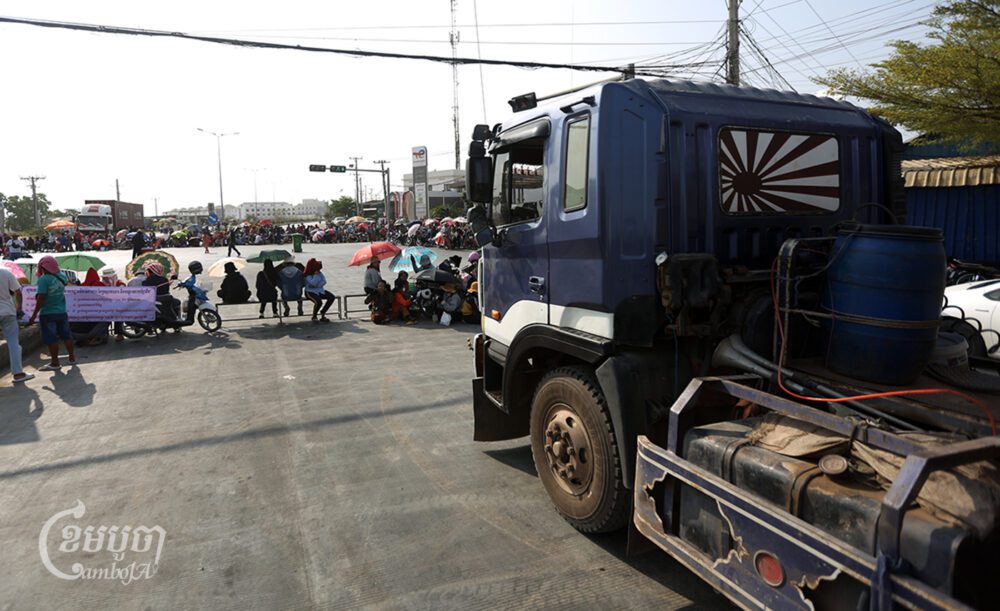Some 1,000 workers of Chinese-owned Y&W Garment in Phnom Penh continue to block the road in protest, demanding that the Ministry of Labor and Vocational Training pay “repair of damage” on top of compensation, seeing that the owner ran away.
At the same time, Kandal province-based R.G Footwear, which was destroyed by fire on March 18, has declared bankruptcy, leaving 2,205 workers clueless as to their future.
In March 2024, two factories closed down causing over 7,054 workers undue stress as they waited for updates on their jobs and compensation, despite the ministry’s intervention and a confirmation by the factory owner.
In a letter viewed by CamboJA, Y&W director Yuen Po Fia informed the administration on March 1, 2024 that the company will no longer operate as “it is in debt and has no buyers”.
“On behalf of Y&W Garment Co Ltd, I am sorry to inform you that Y&W can no longer run the factory as there are no more orders from buyers and customers and the company is in debt,” the announcement read, urging the company for its understanding to “close the business”.
After the factory owner absconded, workers marched to the ministry on March 9, 2024 seeking an intervention as the owner had not paid them their salaries and benefits since February 15, 2024, which was in violation of the labor law.
Following a request for protective order on March 11, 2024, the ministry declared on March 12, 2024, that the Phnom Penh Municipal Court had given a temporary order to confiscate the factory’s assets to pay 4,849 workers.
Despite the announcement of a settlement and the fixing of a payment date by the ministry, hundreds of workers continued protesting at the Baku light station in Dangkor district, calling for compensation in the form of “repair of damage” as their employer ran away.
A worker at Y&W for 12 years, Hun Phana, 43, told CamboJA that she joined the demonstration because the ministry was only paying them benefits based on four points, but not for repair of damage.
Phana explained that the repair of damage is very important for workers who have worked long-term at the company. “Like this case, the owner ran away, so I should be paid damages by calculating the sum based on the number of years I served.”
Phana said she is faced with a huge financial burden after the factory went bankrupt as she has to pay for her children’s school, loan and daily expenses.
“I need to spend more since the owner ran away. It’s more difficult. It is not right that the ministry is [only] providing four of the benefits. If we can’t get 100% of repair damage, we should get 50% at least. They should resolve it,” said Phana.

Although the workers blocked the road for several days, she said there was no crackdown by the authorities. However, she hopes that the ministry will consider all the points proposed by the workers.
Responding to the demands by Y&W workers, who continue to gather and block the road, labor ministry spokesperson Katta Orn requested the union and workers to solve the issue according to the labor law. He stressed that there is no such thing as “repair of damage” when a company goes bust.
“We follow the labor law. It does not have any provision on repair of damage when a [company] becomes bankrupt,” Orn told CamboJA.
Another worker who worked at Y&W for five years, Chea Da, 30, said based on her understanding, the ministry should investigate how the company ended up bankrupt, although in this case the owner ran away from his responsibility.
“What I understand is we demanded five things but the ministry only agreed to four, and not the very important ‘repair of damage’ point. The owner ran away, so we should receive repair of damage,” said Da.
In a statement by the Ministry of Labor, workers were asked to stay calm, refrain from participating in any activities that could harm public order or that of public and private interests. Workers will receive their wages and other benefits at Dangkor District on March 23, they said.
“The ministry has sufficient funds from the procurement procedure to compensate all workers and is committed to protecting the legitimate interests of workers,” the statement read.
Khun Tharo, program manager for the Center for Alliance of Labor and Human Rights (CENTRAL), said the organization is directly verifying Y&W’s relationship with the customers who used to order from it, such as Nike.
Although the court issued an order to seize the factory property to be sold, “no one knows the total proceeds of sale that was raised”, he mentioned.
“That amount will let us know if the payment is enough,” he said. “We are monitoring whether workers are going to be paid their wages on Saturday so that buyers are [seen to be] performing their duty in accordance with the principles of corporate social responsibility.”
On the workers’ demand for repair of damage, Tharo explained that the Labor Law states that it is equivalent to “compensation of information”.
Therefore, if a worker has a contract of employment for an indefinite period, the compensation they get depends on the number of years the worker was employed.
Tharo disagreed with the ministry in saying that workers cannot be compensated for repair of damage. Workers cannot receive repair of damage due to bankruptcy. “I do not think this [ministry] claim is correct, what the ministry announced is a separate interpretation.”
Meanwhile, R.G Footwear, a subsidiary of Li Yuen Footwear (Holding) Co Ltd, which issued a statement to workers on March 22, following the fire, said they are “completely in a serious crisis”. They “cannot restore the situation, so the company has gone bankrupt”.
There were 2,205 workers working at R.G Footwear. In the statement, the factory said on March 20, they had already paid five percent of benefits to 918 workers. The company would pay the wages no later than April 10, 2024.
“The company is still looking for ways to pay workers, so workers do not have to worry about wages,” the factory said.
R.G Footwear produces shoes for Brunt Footwear in the US and Puma of Germany.
After learning about R.G Footwear’s bankruptcy announcement, worker Kong Sophea told CamboJA that 500 workers placed their thumbprints in a letter for submission to the ministry on Saturday, as well as the parent company and buyers.
They are worried about their benefits and disagreed with the company’s bankruptcy claim. “How can it be bankrupt? The other branches of the factory are still operating. [It can only be] bankrupt if all the branches are bankrupt,” said Sophea.
While R.G Footwear did not provide compensation to all workers, they transferred some of them to work at their branches. But Sophea insisted that the factory provide a solution to their wage problem based on the labor law.
“The factory calculates only 18 days and no annual salaries although we have been working here for many years. I want [the factory] to respect [our contract] and solve [the problem] based on our law,” said Sophea.
With regards to R.G Footwear, which declared itself bankrupt, the labor ministry’s Orn said the law states that only the court can declare a company bankrupt, not the administration.
“Any company or shareholder can file for bankruptcy and [wait] for the court’s official decision,” he shared. Only then can a company declare bankruptcy.

In this case, Orn said, the company has taken responsibility for the situation as it said annual salaries will be paid to workers no later than April 10, thus it should not leave an effect on workers.
He did not specify the number of workers who received new jobs, but he stated that the ministry has sent the National Agency for Employment (NEA) to provide job opportunities for workers.
Meanwhile, Tharo acknowledged that R.G Footwear had lost a large amount of property in the fire, but the employer cannot use the excuse of bankruptcy to avoid paying the workers.
“The authorities should also investigate to confirm whether it is really bankrupt or not, because the owner still has other factories,” he said.
If stakeholders cannot resolve this through investigation, he fears that in future other factories might use similar strategies to avoid paying workers’ benefits.








